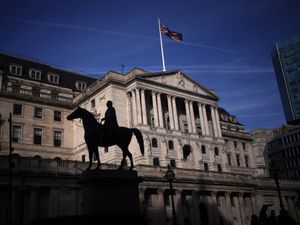Global stability risks rise as US tariffs could weigh on growth, Bank warns
It follows US President Donald Trump announcing a series of new and higher tariffs on all imports to the US.

Risks to the stability of the world’s financial system have increased as US tariffs could weigh on global economic growth, the Bank of England has warned.
Households and businesses nonetheless remain resilient and the UK banking system is equipped to support them even through a period of stress, the Bank’s Financial Policy Committee (FPC) said in its latest report.
“The global risk environment has deteriorated and uncertainty has intensified,” the FPC found.
“The probability of adverse events, and the potential severity of their impact, have risen.”
It follows US President Donald Trump announcing a series of new and higher tariffs on all imports to the US, resulting in retaliatory charges including by China.
The major shift in global trade arrangements could “harm financial stability by depressing growth” in the world’s economy, the Bank said.
These risks are “particularly relevant” to the UK because it is an open economy with a large financial sector.
UK household borrowers, like people with a mortgage, and businesses with loans have remained resilient on the whole, according to the FPC.
However, some companies – such as those that are backed by private equity – are more vulnerable to global developments.
Since Mr Trump’s tariff announcements last Wednesday, the prices of global stocks, commodities, and risky corporate credit have dropped sharply and the value of the US dollar has fallen.
This has resulted in turmoil in global financial markets amid growing fears over a global trade war and the threat of a looming recession in the US.
While volatility “rose significantly” and there have been “exceptionally high” volumes of trade, the market continues to function in an orderly way, the FPC found.
Nevertheless, the risk of further sharp falls in asset prices remains high.
The FPC judged that the UK banking system remains strong enough to support households and businesses, even if economic conditions became much worse than expected.
The level of business insolvencies remained slightly higher but still below recent peaks, and mostly affecting very small firms with little or no bank debt.
Overall profits also edged lower in 2024 following strong growth in 2023, the report found.





